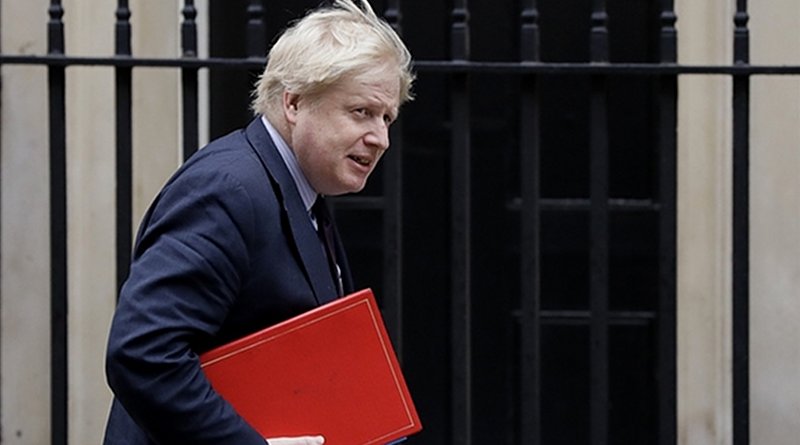With No Opposition To Boris, The UK’s Road To Peril – OpEd
By Arab News
By Yossi Mekelberg*
The British people have been criticized over the past decade for not delivering a clear result in parliamentary elections, but they definitely redeemed themselves this month.
The implications of handing the Conservative Party a resounding victory, as Boris Johnson returns to 10 Downing Street with an 80-seat majority in the House of Commons instead of the stalled minority government he had led before the election, remain to be seen. The obvious and immediate effect one is that the Brexit bill rejected by Parliament before the election will now become law next month, while the opposition Labour Party has experienced a crushing defeat, its worst since 1935.
In the most crucial national election in living memory, the British public faced a political system battered and exhausted by the catastrophic handling of a single issue, namely Brexit. Worse, the choice between the two party leaders, Boris Johnson and Jeremy Corbyn, was mainly an exercise in damage limitation; until populism took hold in many parts of the world, including Britain, neither would have been able to sniff power, far less be seriously considered viable candidates for the top job.
Moreover, it was a contest between two leaders with limited popularity, questionable credibility, and no proven track record of competence. On the eve of the election, 47 percent of Britons held a negative view of Boris Johnson, and 35 percent perceived him in a positive light. However, it was the unpopularity of the leader of the Labour Party, of whom 61 percent of those surveyed had a negative image and only 21 percent a positive one, that better explains the magnitude of the Conservatives’ victory. It was more a total rejection of Corbyn and Cobynism than an endorsement of Boris Johnson and his “Get Brexit Done” brigade.
Considering that the prime minister has a reputation as a liar, a racist to whom insulting minorities is second nature, and an amateur negotiator in dealing with Brussels; is putting the National Health Service at risk of privatization and has launched assaults on the legal system and the BBC; then the failure of Labour, its leader and his hard-core Momentum supporters becomes even more spectacularly clear.
It is hard to think of when there was a better opportunity for Labour to replace a Tory government, after a decade-long litany of failures culminating in putting the country through the Punch and Judy show of Brexit. However, Corbyn and his loyal lieutenants were running the party like a sect; former Labour Cabinet minister Alan Johnson described Momentum as doing student politics, and characterized Corbyn’s leadership as one that “couldn’t lead the working class out of a paper bag.”
This was a damming, tough and accurate verdict on an unsophisticated and uninspiring election campaign, led by someone who failed to make the transition from being a fringe activist-politician into a viable contender for the premiership. The constant vacillations on Brexit, with his now infamous “neutrality” on the issue, purging the party of dissenting voices and electioneering in a Father Christmas-like manner, in addition to promising to nationalize utilities, scared most of the public, to a large extent because of the general distrust of the messenger himself and those who surrounded him.
Indeed, after more than a decade of austerity, people are longing, and the economy is desperate, for a change of direction, as inequalities are constantly increasing, public services are deteriorating, remuneration for those employed has stalled and the privatized utilities are mainly serving their shareholders and executives rather than the public. Therein lies the missed opportunity by which a Labour agenda that could have been modern, radical and coherent came across mainly as a return to tax-and-spend that would damage the economy instead of reforming it.
As much as the supporters of Corbyn are bemoaning the media’s vilification of their leader, what lost him the election were his lack of charisma, his failure to marshal details and his inability to dust off his past and convince enough people that he represented the future. In the final analysis Corbyn and Corbynism have proved to be a vanity project that cost his party dearly and most probably the country too.
With a big majority in Parliament, Johnson has been granted the power and legitimacy to take the UK out of the EU, but it would be an illusion to think that the Brexit saga is over. Johnson’s lack of interest in details, when future negotiations on relations with the EU and the rest of the world require the closest of attention to detail, should be a great worry, as much as his lack of a coherent vision for the future of the UK.
If Europe and Brexit have dominated British politics in recent years, its outcome, combined with the emphatic victory of the Scottish National Party in Scotland, taking 48 out of 59 available seats, may mean not only the EU losing a member, but the UK losing one too.
Numerically, the Conservatives’ victory leaves them with the power to pursue a “One Nation” agenda; however, they are led by a volatile prime minister, and policies that fall short of being able to address the acute challenges the country faces, including the protracted Brexit crisis, the future of Scotland, and the two critical issues of public services and climate change. With Labour in complete disarray and unable to be an effective opposition for at least the time being, and relations with the EU becoming looser, there are growing dangers for the direction in which the country is heading.
- Yossi Mekelberg is professor of international relations at Regent’s University London, where he is head of the International Relations and Social Sciences Program. He is also an associate fellow of the MENA Program at Chatham House. He is a regular contributor to the international written and electronic media.

